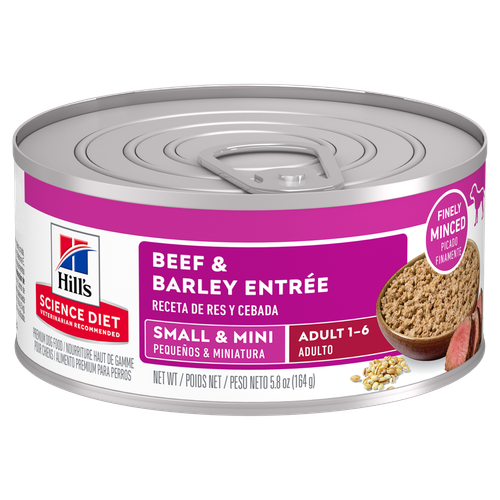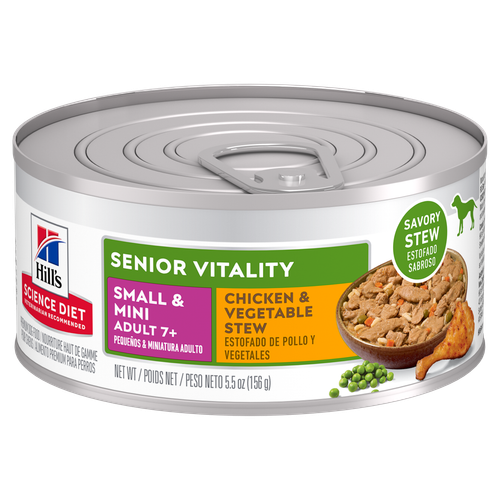
-
Find the right food for your petTake this quiz to see which food may be the best for your furry friend.Find the right food for your petTake this quiz to see which food may be the best for your furry friend.Featured products
 Adult Chicken & Barley Recipe Dog Food
Adult Chicken & Barley Recipe Dog FoodSupports lean muscle and beautiful coat for adult dogs
Shop Now Hill's Science Diet Adult Chicken & Beef Entrée Dog Food
Hill's Science Diet Adult Chicken & Beef Entrée Dog FoodChicken & Beef Entrée in a delicious loaf with complete & balanced nutrition to help keep adult dogs active and healthy
Shop Now Adult Large Breed Chicken & Barley Recipe Dog Food
Adult Large Breed Chicken & Barley Recipe Dog FoodSupports healthy joints, lean muscle, and beautiful coat for large breed dogs
Shop NowFeatured products Kitten Sensitive Stomach & Skin Salmon & Vegetable Stew
Kitten Sensitive Stomach & Skin Salmon & Vegetable StewSupports kitten growth, digestive health, nourishes skin and promotes a lustrous fur
Shop Now Adult Perfect Weight Vegetable & Turkey Medley Cat Food
Adult Perfect Weight Vegetable & Turkey Medley Cat FoodOver 70% of cats lost weight within 10 weeks when fed this nutrition
Shop Now Adult Urinary Hairball Control
Adult Urinary Hairball ControlSupports the health of the whole urinary system with optimal levels of magnesium
Shop Now -
Dog
- Dog Tips & Articles
-
Health Category
- Weight
- Food & Environmental Sensitivities
- Urinary
- Digestive
- Joint
- Kidney
-
Life Stage
- Puppy Nutrition
- Adult Nutrition
- Senior Nutrition
Cat- Cat Tips & Articles
-
Health Category
- Weight
- Skin & Food Sensitivities
- Urinary
- Digestive
- Kidney
-
Life Stage
- Kitten Nutrition
- Adult Nutrition
Featured articles How to Properly Mix Wet & Dry Pet Foods
How to Properly Mix Wet & Dry Pet FoodsAn Orange cat eating from a bowl filled with mixed food
Read More The Science Behind Our Love for Pets
The Science Behind Our Love for PetsLearn the scientific reasons why we have such strong connections with our pets, and what science says about the love between humans and our furry friends.
Read More What Is Littermate Syndrome? Pet Adoption Guide
What Is Littermate Syndrome? Pet Adoption GuideLearn more about littermate syndrome in dogs and cats and how to successfully navigate adoption and early socialization processes.
Read More -


Related Image Content
What is Urolithiasis?
Urolithiasis is a urinary tract disease in which crystals or stones form within the urinary tract and cause irritation, pain and possibly blockage.
What are urinary bladder stones?
Urinary bladder stones (also known as uroliths) are collections of mineral crystals that combine together to form a stone in the urinary bladder. Less often, stones may form in the kidneys. The pH of your dog’s urine affects the development of the crystals that lead to urinary bladder stones. The most common type of stone/crystal is struvite, and these tend to form in alkaline urine. Other types develop in more acidic urine.
What causes urinary bladder stones?
Though there is no single cause of urolithiasis, or urinary tract disease, veterinarians recognize there are components that may contribute to the prevalence of the disease. Factors, that increase your dog’s likelihood of developing a problem include:
Age: Dogs between the ages of 2 and 10 are most susceptible.
Gender: Both males and females get the disease with equal frequency, but males have a greater risk of life-threatening urethral obstruction from the crystals or stones
Infection: Bacterial infection of the bladder, causing alkaline urine, is the main cause of struvite crystal formation.
Food: You already know the food you feed your dog is extremely important in keeping him healthy. But feeding him the wrong kind of food can cause urolithiasis. High levels of certain minerals in dog food can increase the chance of crystal formation in urine. Magnesium and phosphate are mineral components of the most common crystal type struvite. Don’t feed a dog food with excessive amounts of these minerals. The dog food your dog eats also influences urine acidity (pH). This may encourage certain stones to form, so it’s important to feed a dog food that supports bladder health.
Low water intake: Not taking in enough water leads to more concentrated urine, which may increase the likelihood of stones forming.
Breed Predisposition: Small breed dogs are more susceptible than large breed dogs. Also, certain dog breeds, such as miniature schnauzers, Dalmatians, Yorkshire terriers and bulldogs, are more prone to develop urinary bladder stones.
Other contributing factors can be lack of exercise, inability to urinate frequently (typical in a confined indoor dog), or reduced water intake.


Tasty Tips
Does my dog have a urinary problem or bladder stones?
If your dog has urinary problems, he may be very uncomfortable. It’s important to contact your veterinarian immediately for a complete examination if you notice any of the following common signs below.
- Straining when urinating
- Blood in urine
- Licking the genital area
- Incontinence or an inability to control urination
- Decreased urine flow
- Frequent attempts to urinate
- Reduced appetite
- Lack of energy or interest in normal activities

IMPORTANT: If your dog is not urinating freely, a urinary blockage may be the cause. Consult your veterinarian immediately as this condition could be life threatening.
Treatment: The importance of nutrition
The dog food your dog eats plays an, important role in his overall health and well-being. Balanced nutrition is an essential part of an active, healthy lifestyle. When your dog has urinary bladder stones, it is even more important to feed the right dog food. Foods high in magnesium, phosphorus, protein and calcium have been linked to stone formation. Veterinarians believe feeding your dog a food with restricted amounts of these minerals can assist in the dissolution of some types of stones that have formed in his urinary tract. For accurate diagnosis and treatment options, always consult your veterinarian and ask them to recommend the best food for your dog’s urinary tract health.
And remember, any dog that has been treated for urinary tract disease runs the risk of contracting it again. Therefore, it's important to continue with the nutritional management of the disease and watch closely for the recurring symptoms.
Urinary Health Questions to Ask Your Veterinarian
- What may be causing my dog’s accidents? What are the short-term and long-term treatment options?
- Be sure to ask if infrequent or non-patterned accidents may be a sign of a more serious ,problem.
- Ask if the problem is behavioral, environmental or medical.
- Ask how nutrition and water consumption may be affecting your dog’s health.
- Should nutrition be a part of my dog’s treatment regimen? Would you recommend a Prescription Diet® dog food for my dog’s bladder health?
- What if I have multiple dogs? Can I feed them all the same dog food?
- How can nutrition help? What is the benefit of feeding therapeutic nutrition as part of treatment which may include administering pills?
- What are the pros and cons of using nutrition to help manage my dog’s urinary health?
- Which form of dog food is better for urinary issues, kibble or wet? Why?
- If you feed your dog a mixture of kibble and wet food, ask which therapeutic formulas can be mixed.
- How long will I need to feed the recommended dog food to my dog?
- Ask how feeding a therapeutic dog food can help promote long-term urinary health for my dog?
- What is the best way (email/phone) to reach you or your hospital if I have questions?
- Ask if you need a follow-up appointment.
- Ask if a reminder email or notice will be sent.
Related products

Supports healthy joints, lean muscle, and beautiful coat for large breed dogs

Chicken & Barley recipe and Beef & Barley recipe with precisely balanced nutrition to keep adult dogs active and healthy.

Supports lean muscle and beautiful coat for adult dogs

Nutrition that helps a senior dog's everyday ability to get up and go
Related articles

Learn how to help keep your dog's immune system in tip-top shape, including nutritional immune system support for dogs and other strategies.

Wondering where can I buy a dog? Consider adoption and explore the pros and cons of adopting a dog from a breeder versus an animal shelter.

Your dog's coat and skin are a big part of your dog's overall health. Ensure you keep your dog's coat healthy, by following these simple tips.

Discover how the field of dog science is giving us more and more insights into the inner workings of our furry best friends.

Put your dog on a diet without them knowing
Our low calorie formula helps you control your dog's weight. It's packed with high-quality protein for building lean muscles, and made with purposeful ingredients for a flavorful, nutritious meal. Clinically proven antioxidants, Vitamin C+E, help promote a healthy immune system.
Put your dog on a diet without them knowing
Our low calorie formula helps you control your dog's weight. It's packed with high-quality protein for building lean muscles, and made with purposeful ingredients for a flavorful, nutritious meal. Clinically proven antioxidants, Vitamin C+E, help promote a healthy immune system.


